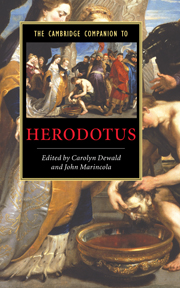Book contents
- Frontmatter
- Introduction
- 1 Herodotus and the poetry of the past
- 2 Herodotus and his prose predecessors
- 3 Herodotus and tragedy
- 4 The intellectual milieu of Herodotus
- 5 Meta-historiē: Method and genre in the Histories
- 6 The syntax of historiē: How Herodotus writes
- 7 Speech and narrative in the Histories
- 8 Herodotus, Sophocles and the woman who wanted her brother saved
- 9 Stories and storytelling in the Histories
- 10 Humour and danger in Herodotus
- 11 Location and dislocation in Herodotus
- 12 Herodotus and the natural world
- 13 Herodotus and Greek religion
- 14 Warfare in Herodotus
- 15 Herodotus, political history and political thought
- 16 Herodotus and the cities of mainland Greece
- 17 An alternate world: Herodotus and Italy
- 18 Herodotus and Persia
- 19 Herodotus and foreign lands
- 20 Herodotus' influence in antiquity
- Glossary
- Timeline
- Bibliography
- Index
- Series List
10 - Humour and danger in Herodotus
Published online by Cambridge University Press: 28 January 2007
- Frontmatter
- Introduction
- 1 Herodotus and the poetry of the past
- 2 Herodotus and his prose predecessors
- 3 Herodotus and tragedy
- 4 The intellectual milieu of Herodotus
- 5 Meta-historiē: Method and genre in the Histories
- 6 The syntax of historiē: How Herodotus writes
- 7 Speech and narrative in the Histories
- 8 Herodotus, Sophocles and the woman who wanted her brother saved
- 9 Stories and storytelling in the Histories
- 10 Humour and danger in Herodotus
- 11 Location and dislocation in Herodotus
- 12 Herodotus and the natural world
- 13 Herodotus and Greek religion
- 14 Warfare in Herodotus
- 15 Herodotus, political history and political thought
- 16 Herodotus and the cities of mainland Greece
- 17 An alternate world: Herodotus and Italy
- 18 Herodotus and Persia
- 19 Herodotus and foreign lands
- 20 Herodotus' influence in antiquity
- Glossary
- Timeline
- Bibliography
- Index
- Series List
Summary
As Alan Griffiths has commented, 'humour is altogether a funny business'. What one culture finds funny, another might well find appalling; humour in every culture, however, blends a tacit recognition of conventional, expected standards of behaviour and narrative logic, coupled with a transient, unexpected (and sometimes illicit) pleasure at their momentary transgression. It is safe to say that Herodotus, the father of history, knows how to tell a good story, and his stories frequently strike the suggestible reader as funny. I will make several claims here: first, that humour is one aspect of Herodotus' text that makes credible his assertion that the logoi he tells are not his own invention; moreover, that the humour of the Histories is tied closely to the theme of transgressive violence and danger. Finally, the recurring and various connections between humour and danger in Herodotus point to one of the most fundamental assumptions of historiography: the importance but also the difficulty of ascertaining what is real in to anthrōpinon, the realm of the human.
- Type
- Chapter
- Information
- The Cambridge Companion to Herodotus , pp. 145 - 164Publisher: Cambridge University PressPrint publication year: 2006
- 4
- Cited by



